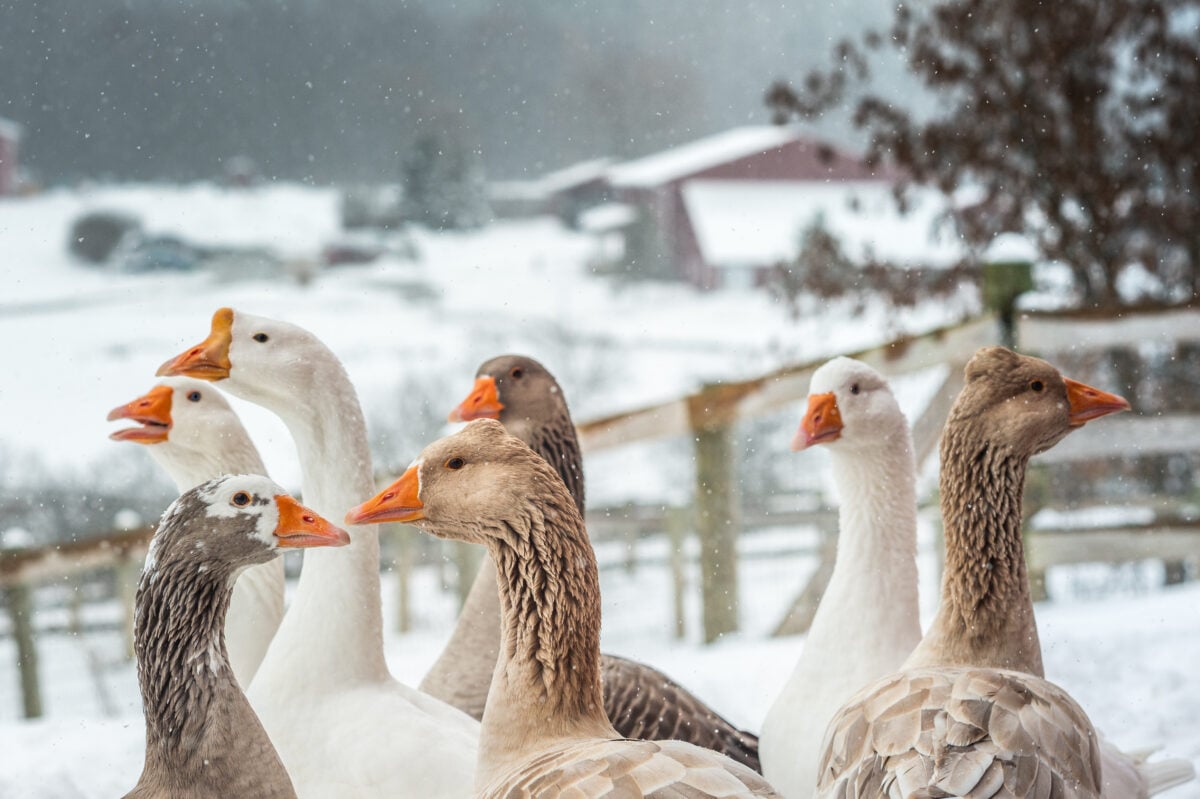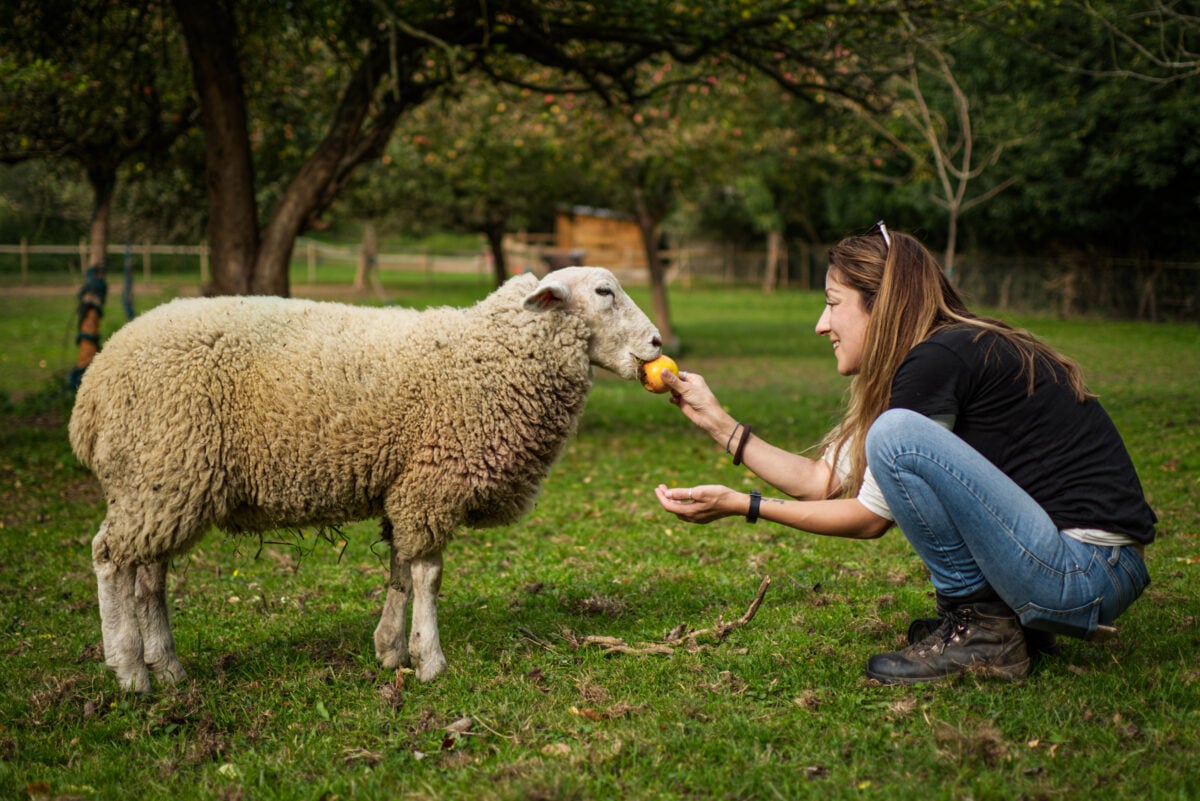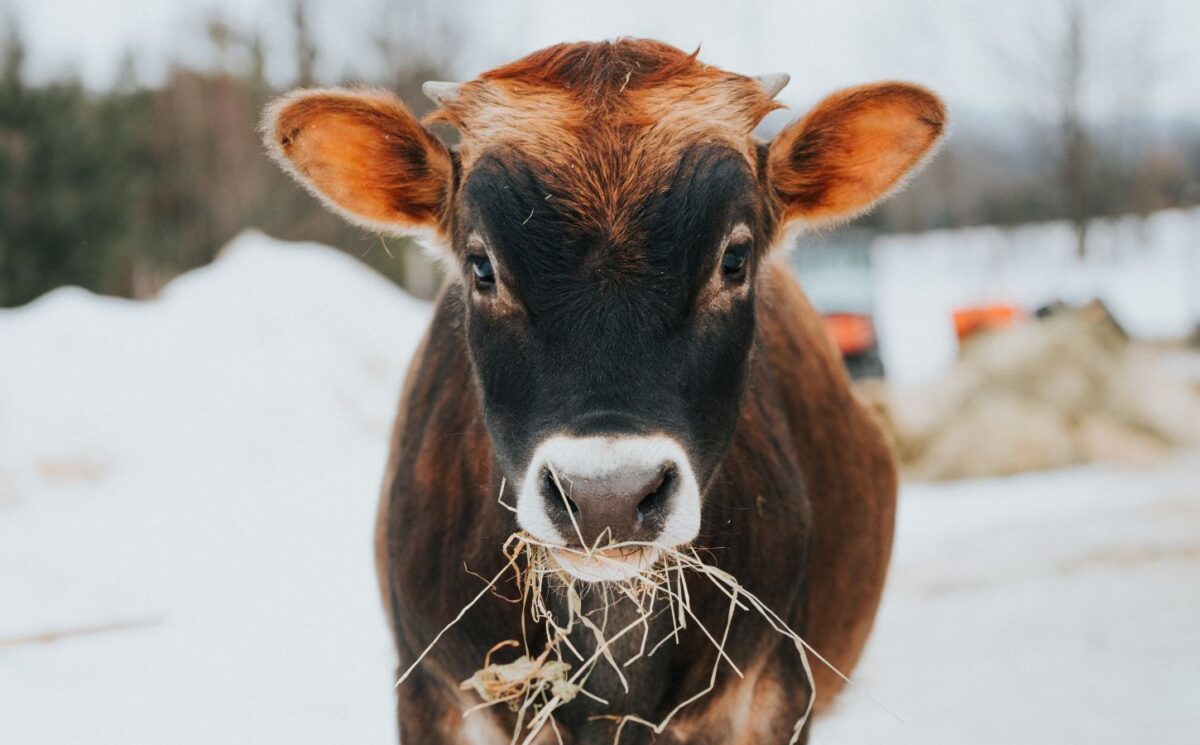Animal sanctuaries do important, difficult work all year round, and the colder months bring additional challenges – increased need for food, bedding, fuel, electricity, and labour. Throw in the ongoing cost-of-living crisis and skyrocketing utility bills, and many beloved sanctuaries are facing an unprecedented existential emergency. Your local animal sanctuary probably needs support to survive this winter, so here’s how to help them keep helping animals.
Before you consider helping sanctuaries, you should always make sure they are legitimate. Check out PETA’s guide on how to tell the difference between sanctuaries and zoos and other animal businesses here.
How to help your local sanctuary
Donate your time
The majority of animal sanctuaries have a relatively small core staff and are heavily dependent on volunteers donating their time and energy to keep things going. Jobs might include anything from feeding and grooming animals to mucking out stables or helping to organize open days, whatever needs doing at any given time.
It’s likely that the workload will be physically demanding but extremely rewarding, if the countless first-hand accounts of volunteers around the world are anything to go by. If you’re not able to help out in person, you could also volunteer any creativity or specialist skills you might have. (Think illustrating merchandise, taking photographs, that kind of thing.)
Donate your money

Most animal sanctuaries have a fundraising or donations page, and giving monthly or one-off donations make a huge difference to the day-to-day practicalities like purchasing food and paying bills. Some sanctuaries even offer the opportunity to sponsor a specific animal, or even provide gifts and perks for regular supporters such as magazines and updates.
Running an animal sanctuary is expensive work. Holly Hedge Animal Sanctuary in Bristol costs approximately £650,000 GBP per year to run – that’s over £1,780 every single day. So when sanctuaries say that every penny donated makes a difference, they really mean it.
Donate resources
Sanctuaries and shelters may take physical donations, and often have specific lists of required items as well as goods they are unable to accept. (For example, many are unable to take opened or partially used bags of food or heavily used beds.) Sometimes shelters may put a specific call out for goods they require a lot of – such as blankets, towels, or toys.
There are also many everyday things that the majority of people – and particularly those with family animals – have in the house already. Cleaning products, detergent, and cleaning sprays are often welcomed, as are grooming supplies or lightly used colars, harnesses, and leads. The easiest way to donate is to contact your local sanctuary and see what they need.
Browse the store

Many animal sanctuaries and shelters may have a physical or online store where you can buy things like merchandise, postcards, guided visits, and even calendars. The online store is usually where you can find an option to sponsor a specific resident of the sanctuary, and some even have animal-specific wishlists for toys, bedding, or specialist foods. Many even have holidays-specific gift options, making them a great ethical choice for the friends and family you still need to find presents for. (Who wouldn’t want to adopt Blue the pig?)
Spread the word
Finally, whether you’re able to donate in other ways or not, simply spreading the word online and offline is a really simple, free way to signal boost individual sanctuaries and the work they’re doing. Some may also have specific animals or causes they are seeking to promote, so again it’s worth checking out your local sanctuary and seeing what they need right now.
Below, we have mentioned just a small selection of sanctuaries to support in the UK and US. Please note: this is far from an exhaustive list. We wish we could mention every sanctuary doing amazing work. Please do your own research to find animal sanctuaries close to you.
Animal sanctuaries to support in the UK and Ireland
Pear Tree Farm
Based in Somerset, Pear Tree Farm was started in 2018 after the owners welcome three pigs (who were booked into a slaughterhouse) into their home. The sanctuary is now home to a wide range of animals, including horses, pigs, and chickens. “Love, compassion and understanding is at the heart of everything we do,” the sanctuary states on its website. “We believe that every life is of equal value.”
Learn more about Pear Tree Farm here.
Dean Farm Trust
Dean Farm Trust is an animal sanctuary based in Chepstow, Wales, and is now how to over 200 rescued animals, including miniature Shetland ponies, donkeys, pigs, sheeps, and chickens. Dean Farm has been at its current 62-acre home since 2016, and is currently fundraising to try and stay open through the coming winter months. “Every penny helps, no matter how small please come together as a community to help our residents,” says the Dean Farm Team.
Learn more about Dean Farm Trust here.
Friend Farm Animal Sanctuary
Kent’s Friend Farm Animal Sanctuary has rescued approximately 3,000 animals since its foundation in 1994, nearly 30 years ago. Friend Farm says that its “mission” is to offer a “lifelong, no-kill, free-roaming, safe-haven, forever home to unwanted, neglected and abused non-human animals, while educating about animals, veganism and ecological sustainability.”
Learn more about Friend Farm Animal Sanctuary here.
Holly Hedge Animal Sanctuary
Holly Hedge Animal Sanctuary is based in Bristol, and provides “shelter from harm and the promise of a brighter future” to dogs, cats, and sometimes smaller furry animals like rabbits. First registered as a charity in 1982, Holly Hedge has changed a lot over the years and is now based in an up-to-date network of kennels that were modernized thanks to its many supporters and donations. Holly Hedge takes as many “death row dogs” from council run dog pounds as possible, and works to place them in forever homes with new families.
Learn more about Holly Hedge here.
Eden Farmed Animal Sanctuary
Eden Farmed Animal Sanctuary is actually located in the Republic of Ireland in County Meath. It’s self-described as a “vegan home where farmed animals who have been rescued from the animal use industries are given sanctuary for life.” Eden was founded in 2008 with two orphaned lambs, and exists today as an animal sanctuary with an explicit dedication both veganism and animal rights and the motto “liberty, equality, veganism.”
Learn more about Eden Farmed Animal Sanctuary here.
Hillside Animal Sanctuary
Norfolk’s Hillside Animal Sanctuary has been campaigning for animals since 1995, and has been home to approximately 2500 horses, ponies, and donkeys, along with many residents rescued from the farming industry. The sanctuary is currently home to over 4000 animals, and offers a variety of different support and donation options via its shop. (Did you know you can feed a rescued dog at Hillside for a week for just £10?)
Learn more about Hillside Animal Sanctuary here.
Animal sanctuaries to support in the US
Farm Sanctuary
Farm Sanctuary was founded in 1986 with a goal of combating factory farming, advocating for institutional reforms, encouraging awareness of farm animals, and promoting the benefits of plant-based living. Based across two locations – Los Angeles, CA, and Watkins Glen, NY – Farm Sanctuary is home to over 600 rescued animals, who the nonprofit says are “ambassadors, representing the billions of farm animals currently in the system.”
Learn more about Farm Sanctuary here.
Rowdy Girl Sanctuary
Rowdy Girl Sanctuary had a notable start when newly vegan Renee King-Sonnen managed to fundraise $36,000 USD, enough to purchase her rancher husband’s beef cattle. The Waelder, Texas-based sanctuary cares for approximately 80 animals at any given time, which requires specialist equipment and constant upkeep. Some of the basics listed by Rowdy Girl Sanctuary include enclosures, fencing, other infrastructure, tools, and large farm equipment, along with staples like food, water, and veterinary care.
Learn more about Rowdy Girl Sanctuary here.
Catskilll Animal Sanctuary
The Catskill Animal Sanctuary is based on a 150-acre piece of land in New York’s Hudson Valley and is home hundreds of rescued farm animals of various different species. (You can meet the residents of Catskill Sanctuary here.) The charity also carries out signature Humane Education programs to help inform about the realities of animal farming and the unique individual personalities of each CA Sanctuary resident.
Learn more about Catskill Animal Sanctuary here.
The Gentle Barn
Spread across three sites – Santa Clarita, CA; Nashville, Tennessee; and St Louis, Missouri – The Gentle Barn is currently home to nearly 200 animals. According to founder Ellie Laks and co-founder Jay Weiner it has saved thousands of animals and hosted over 900,000 people since its humble beginnings in 1999. The Gentle Barn offers tours, field trips, and special events where visitors can interact with and learn about each individual sanctuary resident.
Learn more about The Gentle Barn here.
Pigs Peace Sanctuary
Located just north of Seattle, Washington, Pigs Peace Sanctuary is dedicated to providing a home for “unwanted, abused, or neglected animals in need.” All of the pigs who call the sanctuary home are able to roam freely, choosing where they sleep, graze, and root. Some pigs get up early, some choose to sleep in, and all of the pigs are free to form the friendships and social groups that they are denied within animal agriculture.
Learn more about Pigs Peace Sanctuary here.






